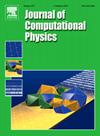通过改变有效扩散来改善采样
IF 3.8
2区 物理与天体物理
Q2 COMPUTER SCIENCE, INTERDISCIPLINARY APPLICATIONS
引用次数: 0
摘要
基于(过阻尼)朗格万动力学离散化的马尔可夫链蒙特卡罗采样器在贝叶斯推理和计算统计物理文献中常用来估计高维积分。我们可以引入一个非恒定扩散矩阵作为这些动力学的前提,并且最近的工作已经优化了它,以便通过克服熵和能量障碍来提高收敛到平稳的速度。然而,所介绍的计算这些最优扩散的方法通常不适合高维设置,因为它们依赖于昂贵的优化程序。在这项工作中,我们提出对一类基于一维集体变量(CV)的扩散矩阵进行优化,以帮助动力学探索由CV定义的潜在空间。选择扩散矩阵的形式是为了在潜在空间中获得一个有效的扩散。我们描述了如何在仿真过程中构造和学习这类扩散矩阵。我们提供了大都市调整朗格万算法和黎曼流形(广义)哈密顿蒙特卡罗算法的实现,并讨论了当CV仅依赖于系统的几个自由度时的数值优化。我们通过计算溶剂中二聚体的两个亚稳态之间的平均跃迁持续时间来说明效率增益。本文章由计算机程序翻译,如有差异,请以英文原文为准。
Improving sampling by modifying the effective diffusion
Markov chain Monte Carlo samplers based on discretizations of (overdamped) Langevin dynamics are commonly used in the Bayesian inference and computational statistical physics literature to estimate high-dimensional integrals. One can introduce a non-constant diffusion matrix to precondition these dynamics, and recent works have optimized it in order to improve the rate of convergence to stationarity by overcoming entropic and energy barriers. However, the introduced methodologies to compute these optimal diffusions are generally not suited to high-dimensional settings, as they rely on costly optimization procedures. In this work, we propose to optimize over a class of diffusion matrices, based on one-dimensional collective variables (CVs), to help the dynamics explore the latent space defined by the CV. The form of the diffusion matrix is chosen in order to obtain an efficient effective diffusion in the latent space. We describe how this class of diffusion matrices can be constructed and learned during the simulation. We provide implementations of the Metropolis–Adjusted Langevin Algorithm and Riemann Manifold (Generalized) Hamiltonian Monte Carlo algorithms, and discuss numerical optimizations in the case when the CV depends only on a few degrees of freedom of the system. We illustrate the efficiency gains by computing mean transition durations between two metastable states of a dimer in a solvent.
求助全文
通过发布文献求助,成功后即可免费获取论文全文。
去求助
来源期刊

Journal of Computational Physics
物理-计算机:跨学科应用
CiteScore
7.60
自引率
14.60%
发文量
763
审稿时长
5.8 months
期刊介绍:
Journal of Computational Physics thoroughly treats the computational aspects of physical problems, presenting techniques for the numerical solution of mathematical equations arising in all areas of physics. The journal seeks to emphasize methods that cross disciplinary boundaries.
The Journal of Computational Physics also publishes short notes of 4 pages or less (including figures, tables, and references but excluding title pages). Letters to the Editor commenting on articles already published in this Journal will also be considered. Neither notes nor letters should have an abstract.
 求助内容:
求助内容: 应助结果提醒方式:
应助结果提醒方式:


